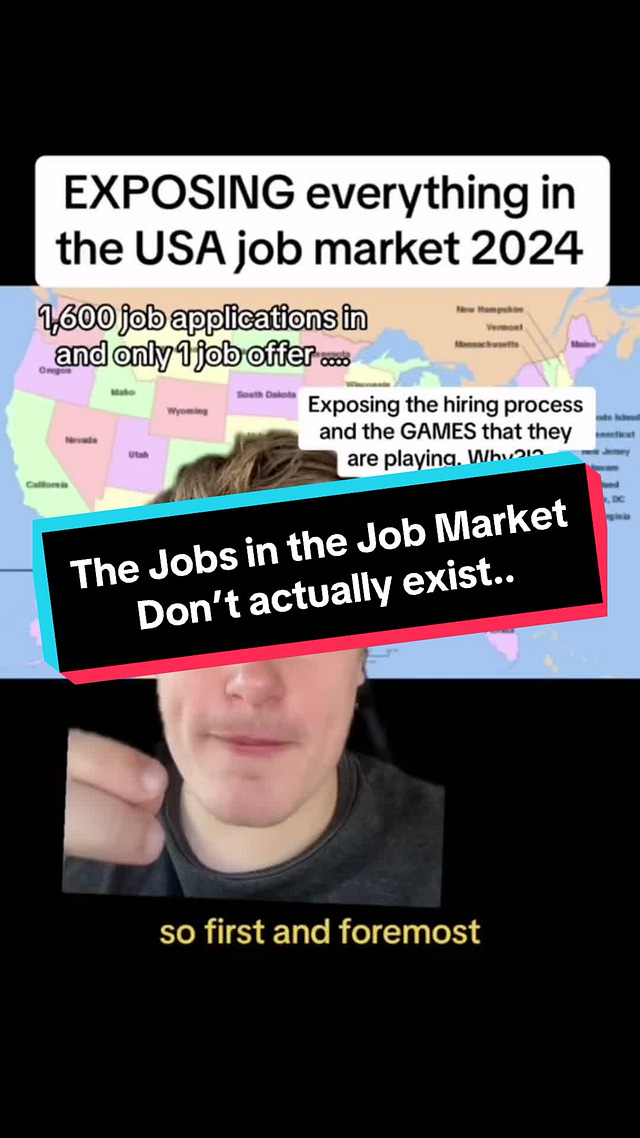LinkedIn to Hypernormalisation
Job search hell, LinkedIn vanity, and lazy girl jobs
Simulation is no longer that of a territory, a referential being, or a substance. It is the generation by models of a real without origin or reality: a hyperreal.... It is no longer a question of imitation, nor duplication, nor even parody. It is a question of substituting the signs of the real for the real.
If you know me in real life, you know I am finally seeing the light at the end of the tunnel of a long job search. When you’re unemployed or looking for a job change nowadays you wind up spending a lot of time on LinkedIn. I would not recommend this unless you are some sort of sicko pervert who gets off on #hustle grindset posts or if you enjoy reading articles from boomers about how we all need to abolish work-from-home so they can get back to feeling up their secretaries in office. In fact, unless you’re also unemployed like me, I am extremely suspect of anyone who enjoys spending time on that app.
But either way, you end up on LinkedIn because it has a good algorithm for finding jobs. And it has one-click-apply. In fact, these one-clickers have launched a stampede in the job market. According to Zety, the average job posting will get 250 applicants. 4-6 of those will get an interview. That is unprecedented. This is not just me crying sour grapes, it’s a problem.
Consider the landscape of a job search in the pre-internet days compared to now. An employer would pay money to advertise their opening in the newspaper. You would open up a newspaper and see a job posting. You would physically go hand your resume into that office and then they would call you for an interview if you’re lucky. Then you’d get a job or not.
Contrast this to the modern job application process. After finding a job post on a site like Indeed or LinkedIn, you go to apply. Mind you, this is if the job is even real. Indeed, Zip Recruiter, and LinkedIn have a nasty habit of hosting scam listings. Some of these fake jobs aren’t even scams, but the real companies who post them simply have no intention of hiring for those positions and it costs nothing to list them. Those postings stay up for months for marketing purposes or to show investors they are “always hiring.” And they admit it themselves. According to the Wall Street Journal:
In a survey of more than 1,000 hiring managers last summer, 27% reported having job postings up for more than four months. Among those who said they advertised job postings that they weren't actively trying to fill, close to half said they kept the ads up to give the impression the company was growing, according to Clarify Capital, a small-business-loan provider behind the study. One-third of the managers who said they advertised jobs they weren't trying to fill said they kept the listings up to placate overworked employees.
Anecdotally, so-called “ghost jobs” are rampant. It isn’t just me who’s experiencing this though. Here’s a recruiter breaking it down on TikTok:

 Tiktok failed to load.
Tiktok failed to load.Enable 3rd party cookies or use another browser
But let's say you get lucky and land on a real job that an employer is really, truly hiring for. So you submit your cover letter and resume and go on your way? No, well not really, if it’s an external site away from the job board, you have to apply on a third-party program. The site will probably make you make an account with your email, which they will probably retain and use to send you marketing emails or worse.
You upload your resume and then fill out boxes with everything that is already ON your resume: demographic information, your contact information, and your address. Then you answer a series of questions about the job: Are you okay working full time? Do you know anyone with the company? From there your resume and information are sent into a program called an ATS or an applicant tracking system. These systems have been around since the 90’s but new ones are much more advanced. This system picks out your work history and scans for keywords that correspond with the job description that was written by the employer, so pray that the person writing the job description did a good job.
If you’re lucky, your resume is then read by a real person. If you’re unlucky, for example, if your resume isn’t formatted in a way the ATS can read or if you didn’t have the correct combination of keywords in your job description, your application gets auto-filtered out. Womp, womp.
Well, what about one-click-apply on Indeed? Surely, that is faster? Maybe. But have you taken all your skill tests? Oh, you didn’t know about those? You idiot. You moron. Those are these really cool quizzes that Indeed offers for employers to give potential applicants. These skill tests cover a range of topics from office management to marketing basics. They can take ten minutes to half an hour. You got time, right? You weren’t planning on doing anything like applying for more jobs? Surely, you didn’t expect them to take your word for it, like people have had to do for all of human history?
This system has created some perverse incentives. Since it costs little to nothing to do so, companies can list fake job postings as long as they’d like. Because job boards have opened up the range of competition for jobs via the internet, they sell companies skill tests that bog down applicants. Because of the influx of applicants from one-click-apply, ever more “advanced” ATS are sold to employers with ever more filters.
It also has second and third order effects. Because online job boards have opened up the pool of competition to essentially everyone in the world, the promise of a perfect applicant who can hit the ground running seems within reach. If you’ve ever wondered how an “entry level position” can require 2 or 3 years of experience, this is why. What this also means is that companies are less willing to train someone who may have soft skills but not the work experience required to do the job. Good luck trying to make a career switch.
Expressing these sentiments in professional culture is verboten. You start talking about systemic issues and you get met with accusations of personal failings. You didn’t tailor your resume enough. You just aren’t up on the latest tips and tricks. You majored in the wrong thing. In the place of solutions to these systemic problems, what gets offered up as a fix is the transformation of workers into brands.
Take a scroll down any LinkedIn feed to see what I mean. What once was a natural social interaction that scarcely needed a name, “networking” has become an active verb done digitally, with no reflection of how people actually talk or interact. It isn’t enough anymore to merely have a skill or experience and apply for a job, but because of how the search has changed, we must now also perform for employment. It isn’t enough that you do work, but you must enjoy your work and be passionate about it. You must build your personality into a brand. And not only that but you must project that “passion” to everyone in a way that borders upon psychosis. The correct answer to the question of “what makes you passionate about search engine optimization?” should be “money” or “are you having a stroke?”
It is worth noting this level of performance has never been required in human history. Here’s a great video on the history of work from Historia Civilis on YouTube (he also has some fantastic videos on Roman history):
The open secret is that no one lives for work no matter how much they convince themselves they do. It is a narrative that we project and that everyone else projects because we are, all of us, in the workforce equivalent of an armed standoff under modern capitalism. Breaking the cycle means being the slow gazelle.
Interacting with these avatars in the professional realm while simultaneously projecting a false self may at times give you a creeping feeling. The term “hypernormalisation” best describes the feeling for me. The term was coined by Russian author and Berkley professor Alexei Yurchak, and popularized by BBC documentarian Adam Curtis in a 2016 film of the same name, who describes it like this:
“[I]n the 80s everyone from the top to the bottom of Soviet society knew that it wasn’t working, knew that it was corrupt, knew that the bosses were looting the system, know that the politicians had no alternative vision. And they knew that the bosses knew that they knew that. Everyone knew it was fake, but because no one had any alternative vision for a different kind of society, they just accepted this sense of total fakeness as normal.”
This is true for almost all social media, but when lunch is on the line, these qualities of simulacra shine through full force. We know what we are interacting with is fake, but getting off the ride is throwing yourself from a moving car.
It’s no surprise then that zoomers and millennials are seeing this as a largely raw deal and walking away. The proliferation of “lazy girl jobs” or young professionals who have taken control of work-life balance has redefined how people are thinking about work. Remote jobs during the pandemic gave us a brief taste of freedom from commuting and the “always on” work culture. Whether this movement will free us from the LinkedIn hyperreality is yet to be seen, but it’s an encouraging start to the conversation. For me, I have long strangled to death my inner girlboss.

 Tiktok failed to load.
Tiktok failed to load.Enable 3rd party cookies or use another browser
As always, I’m afraid things are only going to get weirder. In the meantime, you should subscribe to my newsletter for 10 Great Tips On How To Jumpstart Your Email Marketing Campaign!
Here’s what I’ve been listening to lately:
My next door neighbor who has taken up opera singing
Weightlifters - Car Seat Headrest
Loving Machine - TV Girl
Melissa Juice - Boards of Canada
One That Suits Me - Hop Along
Source: it was revealed to me in a dream





